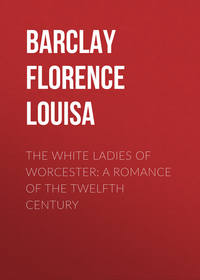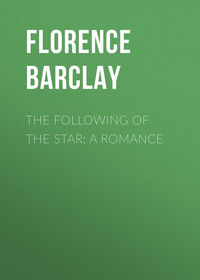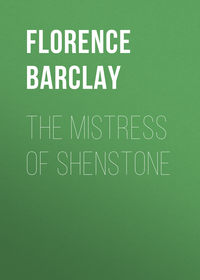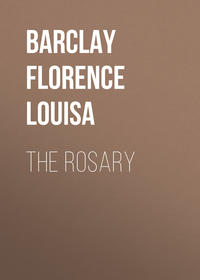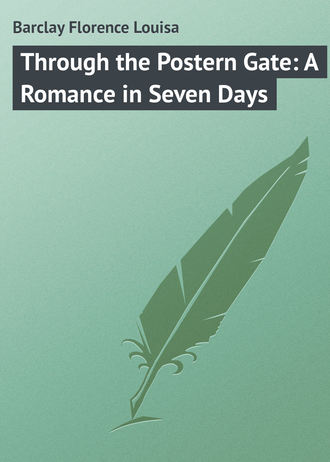 полная версия
полная версияThrough the Postern Gate: A Romance in Seven Days
"Should any one call this afternoon, Jenkins, please remember that I am not 'at home.'"
"Hip, hip, hurrah!" said the Boy.
Then she turned – and her face was all, and more than all, he had hoped it might be.
"Oh, Boy," she said. "Oh, Boy dear!"
After that, it was a very happy tea. Neither had been quite natural, nor had they been really true to themselves, the day before; so the delight of meeting seemed to follow a longer parting than the actual twenty-four hours. The Boy's brown eyes rested in tenderness on the hand that filled his cup, and she did not say "Don't"; she merely smiled indulgently, and added the cream and sugar slowly, as if to let him do what he willed.
The hum of bees was in the garden; a sense of youth was in the air. The sunbeams danced among the mulberry leaves.
The Boy insisted upon carrying back the tray, to do away at once with the possibility of interruption from Jenkins. Then he drew their chairs into the deeper shade of the mulberry-tree, a corner invisible from all windows. The Boy had learned a lesson while looking through the storeroom blind.
There they sat and talked, in calm content. It did not seem to matter much of what they spoke, so long as they could lie back facing one another; each listening to the voice which held so much more of meaning in it than the mere words it uttered; each looking into the eyes which had now become clear windows through which shone the soul.
Suddenly the Boy said: "How silly we were, the other day, to talk of the relative ages of our bodies. What do they matter? Our souls are the real you and I. And our souls are always the same age. Some souls are old – old from the first. I have seen an old soul look out of the eyes of a little child; and I have seen a young soul dance in the eyes of an old, old woman. You and I, thank God, have young souls, Christobel, and we shall be eternally young."
He stretched his arms over his head, in utter joyful content with life.
"Go on, Boy dear," said Christobel. "I am not sure that I agree with you; but I like to hear you talk."
"At first," he said, "our bodies are so babyish that our souls do not find them an adequate medium of expression. But by and by our bodies grow and develop; after which come the beautiful years of perfection, ten, twenty, thirty of them, when the young soul goes strong and gay through life, clad in the strong gay young body. Then – gradually, gradually, the strong young soul, in its unwearied, immortal youth, wears out the body. The body grows old, but not the soul. Nothing can age that; and when at last the body quite wears out, the young soul breaks free, and begins again. Youthful souls wear out their bodies quicker than old ones; just as a strong young boy romps through a suit of clothes sooner than a weakly old man. But there is always life more abundant, and a fuller life farther on. So the mating of souls is the all-important thing; and when young souls meet and mate, what does it matter if there be a few years' difference in the ages of their bodies? Their essential youthfulness will surmount all that."
Christobel looked at him, and truly for a moment the young soul in her leapt out to his, in glad response. Then the other side of the question rose before her.
"Ah, but, Boy dear," she said, "the souls express themselves – their needs, their delights, their activities – through the bodies. And suppose one body, in the soul-union, is wearing out sooner than the other; that is hard on the other – hard on both. Boy – my Little Boy Blue – shall I tell you an awful secret? I suppose I sat too closely over my books at Girton; I suppose I was not sufficiently careful about good print, or good light. Anyway – Boy dear – I have to use glasses when I read." She looked wistfully into his bright eyes. "You see? Already I am beginning to grow old." Her sweet lips trembled.
In a moment he was kneeling by the arm of her chair, bending over her, as he did on the first day; but as he did not do yesterday. Suddenly she realized why she had felt so flat yesterday, after he was gone.
He lifted her hand and kissed it gently, back and palm. Then he parted the third finger from the rest, with his own brown ones, and held that against his warm young lips.
She drew her hand slowly away; passed it over his hair; then let it fall upon her lap. She could not speak; she could not move; she could not send him away. She wanted him so – her little Boy Blue, of long ago.
"Old, my Belovèd?" he said. "You – old! Never! Always perfect – perfect to me. And why not wear glasses? Heaps of mere kids wear glasses, and wear them all the time. Only – how alarmingly clever you must look in spectacles, Christobel. It would terrify me now; but by and by it will make me feel proud. I think one would expect glasses to go with those awe-inspiring classical honours. With my barely respectable B.A., I daren't lay claim to any outward marks of erudition." Then, as she did not smile, but still gazed up at him, wistfully, his look softened to still deeper tenderness: "Dear eyes," he murmured, "oh dear, dear eyes," and gently laid his lips on each in turn.
"Don't," she said, with a half sob. "Ah, Boy, don't! You know you must not kiss me."
"Kiss you!" he said, still bending over her. "Do you call that kissing?" Then he laughed; and the joyous love in his laughter wrung her heart. "Christobel, on the seventh day, when the gates fly open, and the walls fall down; when the citadel surrenders; when you admit you are my own —then I shall kiss you; then you will know what kissing really means."
He bent above her. His lips were very near to hers. She closed her eyes and waited. Her own lips trembled. She knew how fearfully it tempted the Boy that her lips should tremble because his were near; yet she let them tremble. She forgot to remember the past; she forgot to consider the future. She was conscious of only one thing: that she wanted her Little Boy Blue to teach her what kissing really meant. So she closed her eyes and waited.
She did not hear him go; but presently she knew he was no longer there.
She opened her eyes.
The Boy had walked across the lawn, and stood looking into the golden heart of an opening yellow rose. His back appeared very uncompromising; very determined; very erect.
She rose and walked over to him. As she moved forward, with the graceful dignity of motion which was always hers, her mental balance returned.
She slipped her hand beneath his arm. "Come, Boy," she said; "let us walk up and down, and talk. It is enervating to sit too long in the sunshine."
He turned at once, suiting his step to hers, and they paced the lawn in silence.
When they reached the postern gate the Boy stood still. Something in his look suddenly recalled her Little Boy Blue, when the sand on his small nose could not detract from the dignity of his little face, nor weaken its stern decision.
He took both her hands in his, and looked into her eyes.
"Christobel," he said, "I must go. I must go, because I dare not stay. You are so wonderful this afternoon; so dear beyond expression. I know you trust me absolutely; but this is only the third day; and I cannot trust myself, dear. So I'm off!"
He lifted both her hands to his lips.
"May I go, my Queen?" he said.
"Yes, Boy," she answered. "Go."
And he went.
It was hard to hear the thud of the closing door. For some time she stood waiting, just on the inside. She thought he would come back, and she wished him to find her there, the moment he opened the door.
But the Boy – being the Boy – did not come back.
Presently she returned to her chair, in the shade of the mulberry-tree. She lay, with closed eyes, and lived again through the afternoon, from the moment when the Boy had said: "Hip, hip, hurrah!" There came a time when she turned very pale, and her lips trembled, as they had done before.
At length she rose and paced slowly up the lawn. On her face was the quiet calm of an irrevocable decision.
"To-morrow," she said, "I must tell the Boy about the Professor."
In the middle of the night, Martha, being wakeful, became haunted by the remembrance of the smoke, as it had curled from cracks and keyholes in the kitchen. She felt constrained to put on a wonderful pink wrapper, and go creaking slowly down the stairs to make sure the house was not on fire. Martha's wakefulness was partly caused by the unusual fact of a large and hard curl-paper, behind her left ear.
Miss Charteris was also awake. She was not worried by memories of smoke, or visions of fire; and her soft hair was completely innocent of curl-papers. But she was considering how she should tell the boy about the Professor; and that consideration was not conducive to calm slumber. She heard Martha go creaking down the stairs; and, as Martha came creaking up again, she opened her door, and confronted her.
"What are you doing, Martha?" she said.
Martha, intensely conscious of her curl-paper, was about to answer with more than her usual respectful irritability, when the eyes of the two women – mistress and maid – met, in the light of their respective candles, and a sudden sense of fellowship in the cause of their night vigil passed between them.
Martha smiled – a crooked smile, half ashamed to be seen smiling. When she spoke, her aspirates fell away from her more completely than in the daytime.
"'E went crawlin' about the kitchen," she said, in a muffled midnight whisper; "all in 'is white flannels, puffin' smoke in every crack an' 'ole to kill the beetles. So kind 'e meant it; but I couldn't sleep for wonderin' if the place was smokin' still. I 'ad to go down an' see. 'Ow came you to be awake, Miss Christobel?"
"Things he said in the garden, Martha, have given me food for thought. I began thinking them over; and sleep went."
Martha smiled again – and this time the smile came more easily. "'E 'as a way of keepin' one on the go," she said; "but we'd best be gittin' to sleep now, miss. 'E'll be at it again to-morrow, bless 'is 'eart!" And Martha, in her pink wrapper, lumbered upwards.
But the Boy, who had this disturbing effect on the women who loved him, slept soundly himself, one arm flung high above his tumbled head. And if the sweet mother, who perforce had had to let her dying arms slip from about her baby-boy, almost before his little feet could carry him across a room, saw from above the pure radiance on his lips and brow as he slept, she must have turned to the Emerald Throne with glad thanksgiving for the answer vouchsafed to a dead mother's prayers.
"And the evening and the morning were the third day."
THE FOURTH DAY
CHRISTOBEL SIGNS HER NAME
"I am exhausted," said the Boy, reaching out a long arm, and securing his third piece of hot buttered-toast. "I am ruffled. My usual calm mental poise is overthrown – and on the Sabbath, of all days! Every feather I possess has been rubbed up the wrong way." He lay back in the depths of his chair, stretched out his legs, and looked dejectedly at Christobel.
Her quiet smile enveloped him. Her look was as a cool touch on a hot forehead.
"Poor Little Boy Blue! I thought something was wrong. I should feel a keener anxiety, were the hot buttered-toast less obviously consoling."
"I'll jolly well never go again," said the Boy, with indignation. "Not me!"
"Before you were born, Boy; when I went to school," said Miss Charteris, "we were taught to say 'Not I.' And if you were to tell me where you have been, on this Sabbath afternoon, I might be able to give you more intelligent sympathy."
"I've been to a drawing-room meeting," said the Boy, "and I've heard a woman hold forth. For an hour and a quarter, I've sat stuffed up, breathing the atmosphere of other people's go-to-meeting clothes, and heard a good lady go meandering on, while I had no room for my legs."
"I thought you seemed finding them extra long, Boy. Why did you go to a drawing-room meeting?"
"I went," said the Boy, "because the dear old thing in whose house it was held asked me to go. She used to know my mother. When I was at Trinity she looked me up, often invited me to her charming home, gave me excellent little dinners, followed by the kindest, nicest, most nervous little preachments. Don't look amused, dear. I never failed to profit. I respected her for it. She is as good and genuine as they make 'em; and if she had stood up this afternoon, with her friendly smile, and dear shaky old voice, and given us an exposition of the twenty-third Psalm, we should have all come away quite 'good and happy.' Instead of which – oh, my wig!"
The Boy took an explosive bun, and put it whole into his mouth. "The only way to manage them on Sunday," he explained, as soon as speech was possible, "when sweeping is not the right thing. But let us hope Mollie's papa's 'clerical brethren' won't find it out. There would certainly be less conversation and fewer crumbs, but no fun at all."
"I don't think you need be afraid, Boy dear. Even should such a way out of the difficulty occur to them, I am inclined to think they would prefer the explosion, to the whole bun at a mouthful. It has a rather startling effect, you know, until one gets used to seeing it done. I can't quite imagine an archdeacon doing it, while standing on the hearthrug in conversation with my brother. Now tell me what the good lady said, which you found so trying."
"Oh, she meandered on," grumbled the Boy. "She told us all we should have been, if we had not been what we were; and all we might be, if we were not what we are; and all we shall be, when we are not what we are! She implored us to consider, and weigh well, where we should go, if, by a sudden and unexpected dispensation of Providence, we ceased to be where we then were. I jolly well knew the answer to that; for if Providence had suddenly dispensated – which it didn't, for a good three-quarters of an hour – I should have been here, here, HERE, as fast as my best Sunday boots could carry me!" His brown eyes softened. "Ah, think what 'here' means," he said. "Think! 'Here' means You!"
But Miss Charteris did not wish the conversation to become too meltingly personal.
"What else did she say, Boy?"
He consulted the mulberry leaves, then bounded in his chair. "Ha, I have it! I kept this tit-bit for you. She used an astronomical illustration, I haven't the least idea apropos of what, but she told us exactly how many millions of miles the sun is from the earth; and then she smiled upon us blandly, and said: 'Or is it billions?' Think of that! She said: 'Or is it billions?' in exactly the same tone of voice as she might have said of the bonnet she had on: 'I bought it, at a sale, for elevenpence three farthings, or was it a shilling?'"
"Oh, Boy, you really are naughty! I never connected you with personal sarcasm."
"Yes, but that sort of woman shouldn't," complained the Boy. "And with half Cambridge sitting listening. 'Millions, or is it billions?' Oh lor!"
"Poor thing!" remarked Miss Charteris. "She could not have known that she had in the audience a person who had only just avoided the drawback to future enterprise, of being Senior Wrangler. Had she realized that, she would have been more careful with her figures."
"Tease away!" said the Boy. "I don't care, now I am safe here. Only I shan't tell you any more."
"I don't want to hear any more, Boy. I always enjoy appreciations, even of things I do not myself appreciate. But non-appreciations do not appeal to me. If a person has meant to be effective and proved inadequate, or tried to do good and done harm, I would rather not know it, unless I can help to put matters right. Have some more tea, Boy; and then I want to talk to you myself. I have something rather special to tell you."
The Boy stood up and brought his cup to the little table. When she had filled it, he knelt on one knee beside her, his elbow on the arm of her chair, and drank his tea there.
"I am sorry, dear," he said, presently. "I won't do it again. Perhaps I listened wrong, because I was bored at being there at all. I say, Christobel – it has just occurred to me – did you know my mother?"
The old garden was very still. A hush, as of the Paradise of God, seemed suddenly to fall upon it. As the Boy asked his quiet question, a spirit seemed to hover, between them and the green dome of mulberry leaves above them, smoothing the Boy's tumbled hair, and touching the noble brow of the woman the Boy loved; a gentle, watching, thankful spirit – eternally remembering, and tenderly glad to be remembered. For a few moments the silence was a silence which could not be broken. The Boy lifted wondering eyes to the moving leaves. Christobel laid her hand upon his, as it gripped her chair. An unseen voice seemed to whisper to the Boy – not in the stern tones of the Church, but as an eager, anxious, question: "Wilt thou – have – this woman – to be thy wedded wife?" And silently the Boy replied: "Please God, I will"; and, bending, kissed the hand resting on his.
The spell lifted. Christobel spoke.
"Yes, Boy dear, I knew her. I have often wondered whether I might tell you. She and my mother were dear friends. I was thirteen when she died. You were three, poor Little Boy Blue! Two things I specially remember about your mother: the peculiar radiance of her face – a light from within, shining out; and the fact that when she was in a room the whole atmosphere seemed rarefied, beautified, uplifted. I think she lived very near heaven, Boy; and, like Enoch, she walked straight in one day, and came back no more. She 'was not'; for God took her."
Another long holy silence. The mulberry leaves were still. Then the Boy said, softly: "Some day, will you tell me heaps more – details – lots of little things about her? No one ever has. But I seem almost to begin to remember her, when you talk of her. Meanwhile, may I show you this?"
He drew from the inner pocket of his coat, a small well-worn pocket-Bible. Opening it at the fly-leaf, he passed it to Miss Charteris.
"It was hers," he said.
She bent over it and read the inscription:
M. A. Chelsea"Through faith and patience inherit the promises."Below, in a delicate writing, traced by a hand that trembled:
To my Baby Boy from his Mother"I have prayed for thee, that thy faith fail not."She looked at it in silence. How much had this book meant during all these years, to the "Baby Boy"? Had the book in his pocket, and the prayers hovering about him, something to do with the fact that he was still – just Little Boy Blue?
The Boy had taken a fountain pen from his pocket, and was shaking it vigorously over the grass.
Now he passed it to her.
"Write your dear name beneath," he said.
Infinitely touched, she made no comment, raised no question. She took the pen, and wrote just "Christobel."
"And the evening and the morning were the fourth day."
THE FIFTH DAY
GUY CHELSEA TAKES CONTROL
"Now, Sir Boy," said Miss Charteris with decision, "this is your fifth day. Our time is nearly over. You have done most of the talking. You have had things entirely your own way. What? … Oh, well, almost entirely your own way. I have allowed you to play your Old Testament game to your heart's content. With commendable adaptability, I have been Jericho, and you have marched round. I have been Jericho in my own garden, and have refreshed the invading army with hot buttered-toast and explosive buns. Now it is my turn to take the initiative. Jenkins having removed the tea, and it being too hot for tennis, I am going to ask you to sit still, while I explain to you quite clearly why I must send you away at the close of the seventh day."
She tried to hide her extreme trepidation beneath a tone of gay banter. She hoped it did not sound as forced to him as it did to herself. The Boy's clear eyes were fixed upon her. Had he noticed the trembling of her hands, before she steadied them by laying hold of the arms of her chair?
"So now for a serious talk, if you please, Sir Boy."
"Excuse me, dear," said the Boy, "the Israelites were not allowed to parley."
"You need not parley," said Miss Charteris; "you are requested merely to listen. You may smoke if you like. I understand cigarette smoke is fatal to black-beetles. Possibly it has the same effect on garden insects. Russell tells me we are overrun by snails. Smoke, Boy, if you like."
"Dear," said the Boy, his head thrown back, his hands thrust deep into his coat pockets, "I never have the smallest desire to smoke in your presence. I should feel as if I were smoking in church."
"Oh, you dear amazing altogether absurd boy! Don't look at me like that. And don't say such unexpected things, or I shall be unable to parley satisfactorily."
"When I went to school," remarked the Boy, "and you were an engaging little girl in a pigtail, I was taught to say: 'Do not look at me thus'; at least, masters frequently appeared to think it necessary to make that remark to me. I can't imagine why; because they were not specially worth looking at; excepting that a very large person, in a very angry condition, always presented a spectacle of extreme interest to my juvenile mind. It was so fascinating to watch and see what they would do next. They were like those wooden monkeys and bears you buy in Swiss shops, don't you know? You pull a hanging string, and their legs and arms jump about unexpectedly. One always felt a really angry grown-up was a mere puppet. Unseen fingers were pulling the string; and it was funny to watch. There was an exciting element of danger, too; because sometimes a hand jerked up and boxed your ears."
"Little Boy Blue," she said, "it must have been quite impossible ever to be mildly angry with you. Either one would have waxed impotently furious; or one would have wanted to – to hug you!"
The Boy leapt up.
"Sit down," said Miss Charteris, "or I shall send you away. And I do not wish to do that; because I have quite made up my mind to tell you to-day, a thing which I suppose I ought to have told you long ago; and I tried to do so, Boy; but somehow you always made it impossible. I want to – to tell you about – the Professor." She paused.
It was so very difficult. It was like rolling a heavy stone up a steep hill. And the Boy made no attempt to help her. He lay back with an exaggerated display of resignation. He looked at her with sleepy, amused eyes. And he asked no questions. The army of Israel obviously declined to parley.
"I have long felt I ought to tell you about the Professor," continued Miss Charteris.
The Boy sighed. "I think I jolly well know all there is to know about professors," he said.
"Not about this one," explained Miss Charteris. "He is my Professor."
"Oh, if he's your Professor," said the Boy, sitting up, "of course I am interested. But I am not sure that I approve of you having a tame Professor; especially when it arrives in goloshes, and leaves them in the hall."
"I am afraid nobody will ask whether you approve or not, Little Boy Blue. The Professor has been a great friend of mine during nearly twelve years; and I think I am possibly – in fact, very probably – going to marry the Professor."
"Really?" said the Boy. "May I ask when he proposed?"
"He has not proposed, Boy."
The Boy produced his pocket-book, took out a calendar, and studied it attentively.
"Then I'm afraid you will have some time to wait," he said. "It will not be leap year again until 1912."
This sounded impertinent; but the Boy could no more have been guilty of intentional impertinence toward her, than he could have picked her pocket; and Miss Charteris knew it. There was one thing of which those who had dealings with Christobel Charteris could always be sure – absolute justice. She had seen the Boy's face whiten suddenly, to a terrible pallor, beneath his tan. She knew he was making a desperate fight for self-control. How best could she help? Her own part seemed almost more than she could manage.
"Come here, Boy dear," she said, holding out her hand.
He hesitated one instant; then rose unsteadily to his feet, and came – not to his usual place at the side, bending over her; but in front of her, on one knee, silently waiting.
She bent forward. "Take my hand, Boy."


